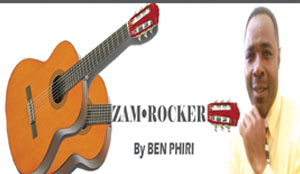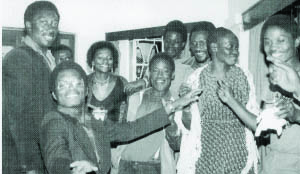It is interesting to note that Zambian legendary musician Nashil Pitchen Kazembe is still a hero especially in East Africa, where people think he hails from.
This is seen from a writer who, during the rundown to that country’s 50th independence anniversary last year, claimed that, Kazembe was actually Kenyan.
But this is not true because Kazembe was purely Zambian and just spent many years in that country pursuing his music career.
For those that missed the earlier write up on Kazembe, are now privileged to know the truth and nothing but the truth.
Nashil Pitchen Kazembe is still considered as Zambia’s national treasure and just a mention of his name, evokes a chain of memories rolled back to the early 1960s when the late Zam-rhumba doyen competed fiercely with Congolese musicians such as, John Bokelo, Baba Gasto Ilunga, Dr Nico and many others.
His music exploits in which he sung mainly in Swahili while in East Africa and back home here, in Chinyanja and Chibemba, was marvelous and exemplary.
Little did people know that most of the hit Swahili songs emanating from East Africa were actually done by Nashil Pitchen and his band, except that the group name, African Eagle Lupopo, was more pronounced than his own.
Pitchen became a star in the whole Southern, Central and Eastern Africa, where his fans literally worshipped him and are still doing so up to now, years after his demise.
Kazembe’s name still remains a paradox and is a legend that the young and upcoming musicians still enquire about.
It has proved very difficult to come across Pitchen Kazembe’s early music especially when he played with Kenyan bands and in fact, that country knows him better than Zambians because he had settled there as early as 1958.
His visit to Kitwe’s Chimwemwe Township several years back, unearthed a lot about this cool and soft-spoken musician whose death more than two decades ago, left a deep scar on the Zambian music industry and up to now, no one has come close to emulating him.
Even miners in Mindolo Mine Township in Kitwe on the Copperbelt where he went to visit, could not help but mob him though, they later felt dumped after he cleverly interacted with them culminating into the release of a hit song, Abalumendo Ba Ku Mindolo, which angered them.
This song exposed and criticised their drinking habits including begging and scrounging for a local brew called Kangala or Ikanga as it was better known during weekends, instead of looking for employment.
The miners did not take this kindly and declared Mindolo, a no go area for Pitchen as they threatened to manhandle and beat him up.
Kazembe spared no one in terms of gender in his songs such as, Chilyelyelye Uleke (Uletekanya mune, ukalya nechakukulya), which attacks gluttons who might end up consuming poisonous food.
As a hit maker, Kazembe churned out singles which were all best sellers and dominated the charts on Teal Record Company and Zambia Music Parlour.
 During the 1970s through to the 80s, Kazembe’s danceable songs were very popular in tavern juke boxes, households and night clubs, competing well with Congolese rumba.
During the 1970s through to the 80s, Kazembe’s danceable songs were very popular in tavern juke boxes, households and night clubs, competing well with Congolese rumba.
He was a darling of the older generation and bands such as the Fire Family for example, benefitted greatly from him as he interacted a lot with local musicians that played Zambian rumba.
Although people suspected that he was Congolese going by the way he arranged his music and sometimes his dressing style, this man was purely Zambian.
Kazembe was born in Chief Nsama’s area close to the Congolese border in Kaputa District, Luapula Province in 1932 and a relative of the Mwata Kazembe kingship of the Lunda kingdom.
He taught himself how to play homemade banjos and later, a guitar and traversed Congo and Tanzania many times.
Years later in 1953, he went to work in the mines in South Africa, where he formed his maiden band, the Bantu Negroes but disbanded after Kazembe returned to Zambia the following year, to become a business executive.
Kazembe also spent some time in Congo, Uganda and Kenya, where he finally settled in 1958.
He ran a fleet of taxis in Kenya and owned a farm, marrying a Kikuyu woman Josephine, with whom he had 12 children.
While in Kenya, he met other legendary Zambian musicians such as, Peter Tsotsi Juma and Benson Simbeye in Mombasa and formed a band called the Congo Kids and performed in the coastal town.
It was in Mombasa that Kazembe became a Muslim and adopted the name Nashil, before returning to Nairobi in 1962, to re-name the band as Congo River Boys.
The Congo River Boys landed their first recording contract years later with Equator Sound studios in Nairobi and released a hit song, Wewe Malaika.
Pitchen’s group comprised Tsotsi Juma, Adolf Banyoro, Charles Ssongo, Gabriel Omolo, Daudi Kabaka and Fadhili Williams Mdawida.
That was the time when Equator sounds released songs like, Zailai Zailai, Taxi Driver, Jifunze mengi Dunia, Pete Ni Alama, Unavyosema and Wewe Jane all of which were hits in East, Central and Southern Africa.
At this point, the group had changed its name to Equator Sounds but later, Tsotsi Juma, Simbeye and a few Congolese band members came together to form the African Eagles Lupopo band, which was a crowd puller in Zambia and East Africa.
With the Lupopo band, Kazembe released songs like, Comrade Kaunda, Mwapoleni Bane (Mwebena Zambia) and Sweet Namusokwe, before releasing another blockbuster, A Phiri Anabwera in 1974.
The A Phiri Anabwera song became the first single to sell more than 50,000 copies in Zambia.
The Eagles Lupopo toured Kenya, Tanzania, Malawi and Zambia more frequently and in 1975, during a show at Lusaka’s Woodlands stadium, the stage was overrun by enthusiastic fans forcing the organisers to abruptly halt the show.
Fans refused to accept the decision to stop the show and became unruly, causing a riot in which all the band’s equipment was completely destroyed.
In 1976, Kazembe came up with the Ochestra Super Mazembe band, co-opting famous Congolese musicians such as Didos Mutonkole and released popular songs like Mushosho, which also became a popular dance in Kenya.
Other songs were Mwana Mazembe, Longwa, Gina and Shauri Yako.
The band also had in its rank and file, the late Lovy Longomba, who was the father of Congolese star, Awilo Longomba.
But as years went on, Kazembe decided to return home in 1979 and started a solo career, sometimes doubling as producer for some local bands and at one time, tutored a young band called Distro Kuomboka, which is now resident at Mukuba hotel in Ndola.
He went on to release two albums, A Phiri Anabwera and Hot hits of Nashil Pitchen Kazembe and had a chain of singles too numerous to mention but some are, Naleli Libota, Nazangi Mwana, Merci Imbwembwe Yandi, Kasongo, Naweli Nini (swahili), Ichi tamfya Abaume (echo nshishibe), Unkhalamba simatenda, Ndelwala Love, Peace Work, Mpandileko Akabwanga, Chuma Chivuta, Ni Mwamuna Wanga Mwana, Lucia, Ba shi Maggie and Bashi Chanda.
Other singles followed and these were Vamahala (Vinantha), Sera, Suzi, Four Wheel Drive (4 x 4), Ngawapata Unip (Ninshi waisalila Ichibi), Anzanga Anizonda and Ba Willie (balume bandi) among them.
In 1986, first republican president Kenneth Kaunda bestowed on him the honorary doctorate of music and that is how he became known as Dr Nashil Pitchen Kazembe.
Overwhelmingly adored by Zam-rumba followers, especially in Mozambique, Zimbabwe, Congo, Kenya and Uganda, Kazembe’s sounds were unique and had a touch of Congolese and East African culture.
His death in 1991, shocked fans and news ripped through the whole of Southern, Central and East Africa, with Kenya dedicating most of the musical radio shows to this Zambian legend, whose music still sounds fresh though he is now no more.
It is not likely that this country shall have another artiste in the likes of Nashil Pitchen Kazembe now or in the near future, who could be able to sing and combine Zambian traditional music with rumba, Soukous, Benga and Kwela rhythms perfectly. He will be missed for ever.
Comments- e-mail benjphiri990@gmail.com-0971-933809; website www.times.co.zm







